12 Best Thinkific Alternatives for Community-Based Training (2026)

TL;DR
- What it enables: Alternative platforms help create interactive learning communities beyond Thinkific's standalone course limitations
- What it includes: AI-powered tools, community features, branding control, analytics, automation, and scalable operations
- Key elements: Community engagement tools, advanced AI integration, custom branding options, and seamless workflow automation
- Top 12 for 2026 include: Disco, Kajabi, Mighty Networks, Teachable, Podia, LearnWorlds, Circle, Skool, LearnDash, ProProfs, TalentLMS, BuddyBoss
- Why it matters: Modern training programs require connected experiences that combine learning, community, and personalization at scale
Reasons to Seek Alternatives
Thinkific is well-suited for creating standalone courses but may lack the tools needed to support vibrant, interactive learning communities.
For organizations managing larger programs, features like in-depth community analytics, event hosting capabilities, and personalization options are often key to creating meaningful learning experiences.
Important Factors to Consider
When designing a modern training program, the tools you choose should support not only the content but also the connections, operations, and identity that make your program unique. Let’s explore the elements that elevate a learning experience into a thriving ecosystem.
Community-Driven Features
Learning doesn’t happen in isolation—it’s powered by interactions. Platforms that offer forums, social feeds, and group chats bring learners together, creating spaces to share ideas, ask questions, and build relationships. Features like live event hosting ensure your community feels dynamic and engaged, fostering collaboration at every step.
Scalable Operations
As your program grows, so do the demands on your team. Scalable platforms with AI-driven tools—like automated reminders or integrated payments—free you from manual tasks, letting you focus on creating impact. Robust analytics provide actionable insights, empowering you to refine your programs and keep learners engaged without missing a beat.
Branding Control
Your training program isn’t just content—it’s an experience that reflects your vision. A platform with full branding control allows you to create a cohesive, professional look, from custom domains to personalized design elements. This ensures every interaction feels intentional and aligned with your identity.
Ease of Use
The best tools are the ones you actually use. Platforms with intuitive dashboards and smooth onboarding workflows make it easy to manage programs, track progress, and connect with learners. Whether you’re building your first course or running a complex academy, simplicity in execution keeps your focus where it belongs: on learning.
Key Considerations When Exploring Thinkific Alternatives
Thinkific is a robust platform for course creation and selling, but its limitations in community engagement and lack of advanced AI tools can hinder scaling for community-based training programs. Here's a breakdown of Thinkific's advantages, limitations, and what to prioritize when evaluating alternatives like Disco.
Thinkific AdvantagesThinkific LimitationsFeatures To Look For When Considering Thinkific AlternativesIntuitive course creation with drag-and-drop toolsLimited community-building featuresAI-powered tools for curriculum design and learner engagementBranded mobile apps for delivering coursesLacks deep AI-driven personalizationAdvanced analytics for learner progress and community insightsIntegrated e-commerce features for selling coursesNo robust tools for fostering interactive communitiesSeamless integration of learning and social featuresAI-assisted landing pages for marketingLimited automation for scaling operationsAutomated workflows to reduce manual tasks and improve efficiencyOffers memberships and live lessonsBasic onboarding and community analyticsComprehensive tools for community engagement, events, and social learning
1) Disco
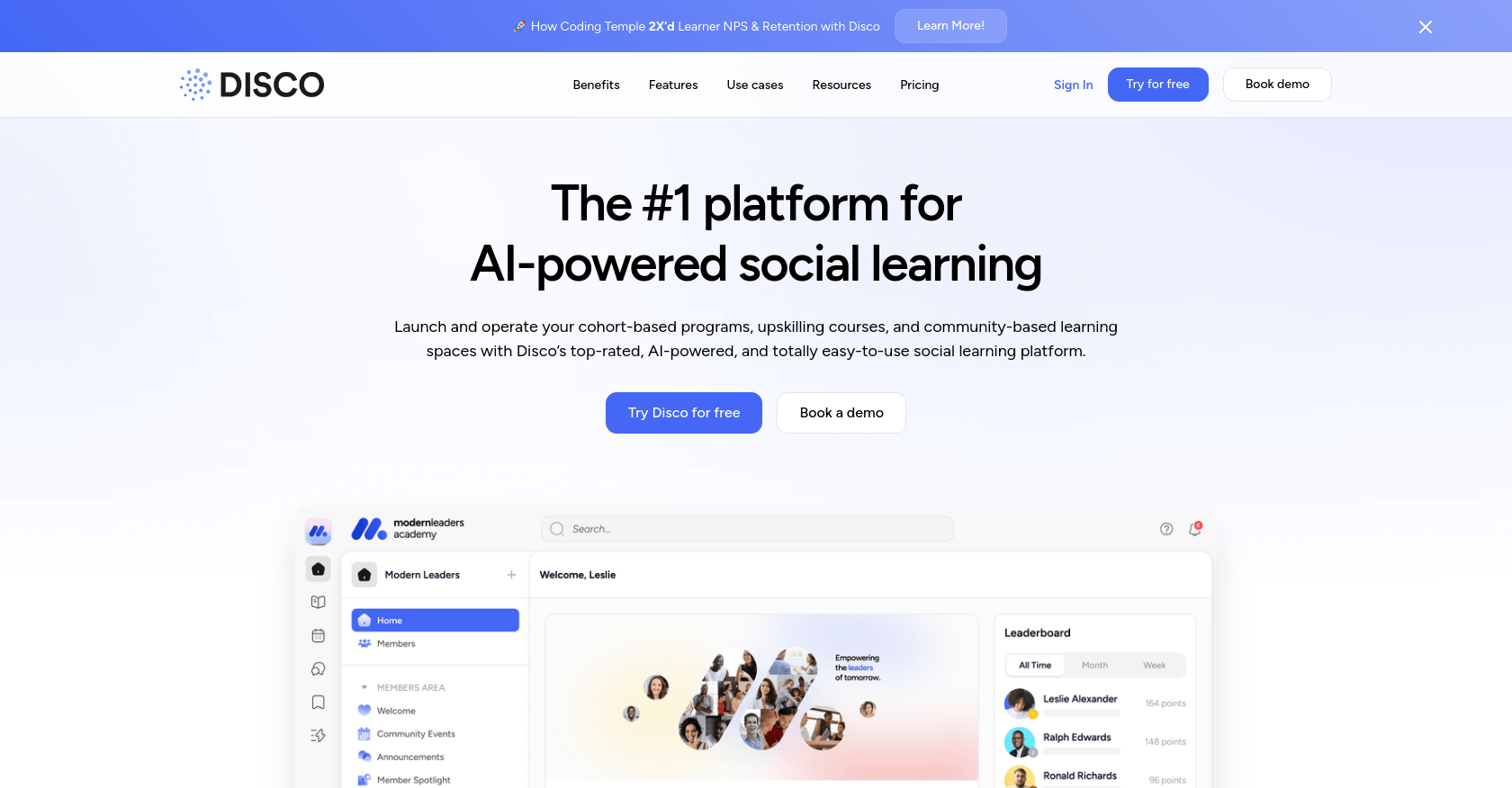
Overview
Disco is reimagining how training businesses and academies build learning experiences that connect, engage, and grow. By seamlessly integrating learning, community, and AI into a single platform, Disco gives educators the tools to design programs that feel meaningful and adaptable at scale.
What sets Disco apart is its ability to simplify complexity. It takes advanced AI and makes it a practical, hands-on partner for learning leaders. Whether you’re building a cohort-based program or a branded membership experience, Disco ensures every interaction is purposeful, every tool intuitive, and every learner supported.
Key Features
- AI-Powered Curriculum Builder: Move from concept to course in minutes. Disco’s AI drafts learning paths, questions, and resources aligned with your goals, letting you focus your energy on personalization and strategy.
- Community-First Tools: Build spaces where connection thrives. Use channels, live events, and branded threads to create a sense of belonging that keeps learners engaged and motivated.
- Insights That Matter: Make data work for you. Disco’s analytics provide clear, actionable insights about learner engagement and program performance, helping you refine and scale with confidence.
- Custom Branding: Your platform, your way. Deliver a fully white-labeled experience with personalized domains, designs, and branding that reflect your organization’s identity.
- Automated Efficiency: Let Disco handle the details. From certificates to reminders, automations keep operations smooth and give you more time to focus on the big picture.
Disco doesn’t just create tools—it empowers educators to craft experiences that are dynamic, personal, and designed for lasting impact.
2) Kajabi
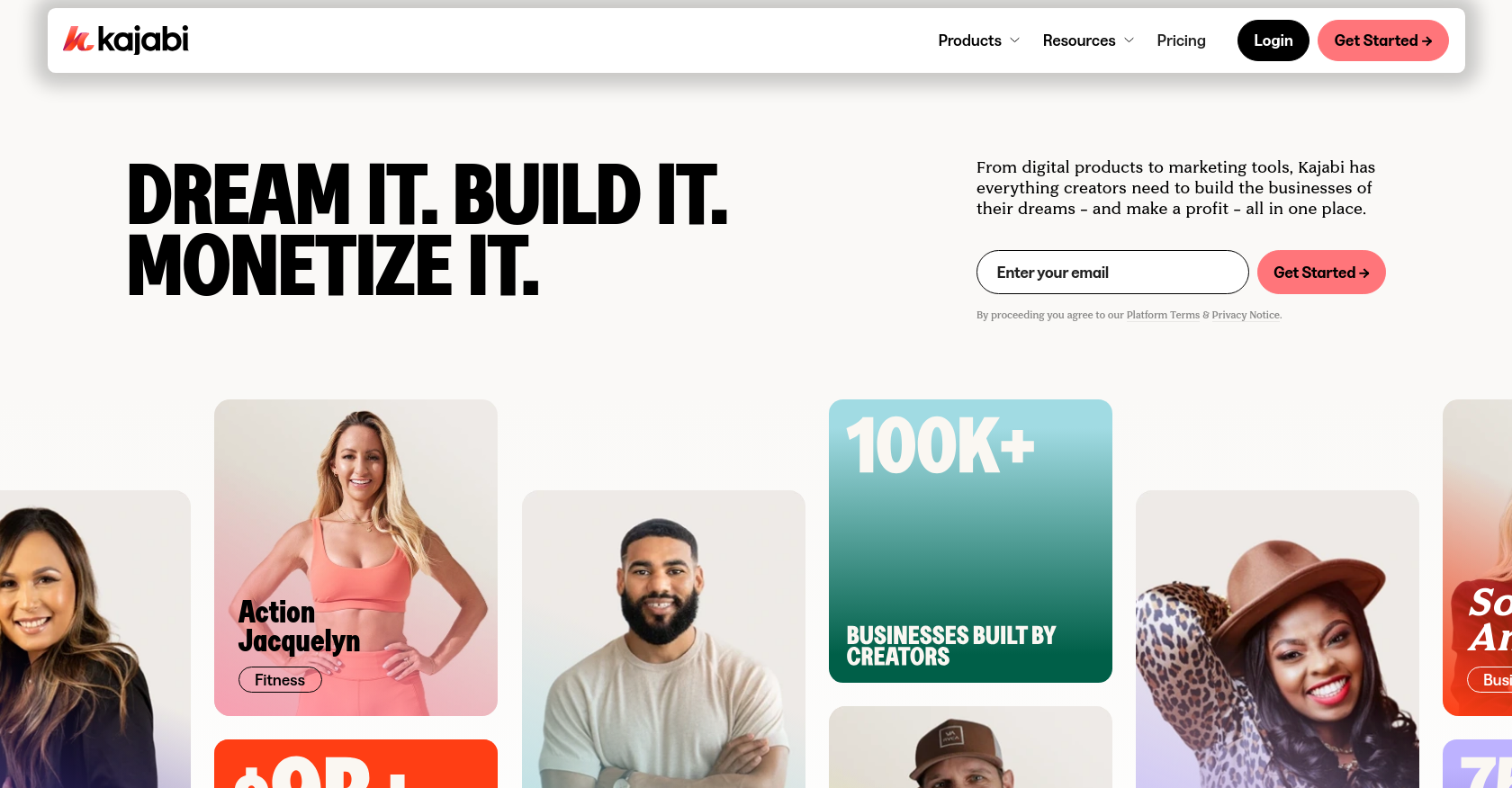
Overview
Kajabi positions itself as a resourceful platform for creators who want to blend course creation with business-building tools. Its strength lies in integrating online learning with marketing funnels, email automation, and membership models, offering a streamlined approach to scaling digital programs.
For those aiming to monetize their expertise, Kajabi simplifies the process by combining key business tools into one platform. However, while it offers marketing efficiency, its ability to foster highly interactive communities may feel more limited compared to platforms designed with engagement at their core.
Key Features
- Integrated Sales and Marketing Tools: Kajabi combines email marketing, sales funnels, and checkout processes into a cohesive system, allowing creators to focus on growth without juggling multiple tools.
- Customizable Digital Spaces: Users can craft landing pages and full websites tailored to their brand using intuitive templates, creating a professional online presence with minimal effort.
- Product Variety: Beyond courses, Kajabi enables creators to offer coaching, podcasts, memberships, and newsletters, encouraging diverse ways to connect with and retain audiences.
While Kajabi emphasizes business growth and revenue channels, creators seeking deeper tools for collaboration, community engagement, or adaptive learning may find that platforms like Disco provide a more dynamic and learner-focused experience.
3) Mighty Networks
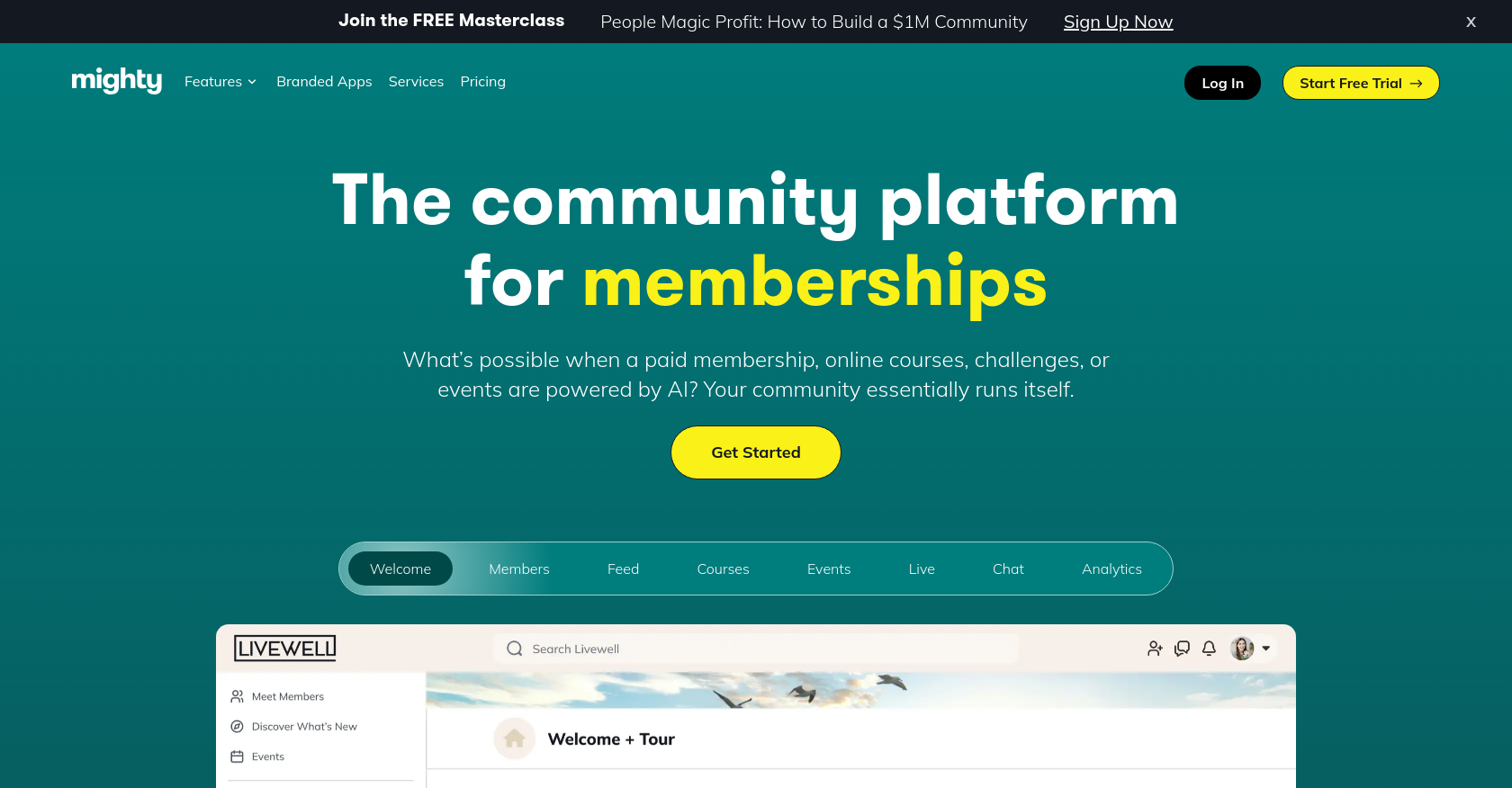
Overview
Mighty Networks is built around the idea that learning thrives when it’s collaborative. By combining courses, events, and interactive spaces, it enables organizations to create learning ecosystems where connection and engagement aren’t just possible—they’re the foundation.
For training businesses, Mighty Networks offers a pathway to design subscription-based communities that feel personal while still being scalable. It’s a platform that prioritizes social interaction, bringing people together through shared learning experiences in a seamless, branded environment.
Key Features
- Integrated Community Tools: Community walls, subgroups, and live streams create vibrant spaces for members to connect and share knowledge.
- Mobile-First Design: Clean, intuitive mobile apps ensure learners stay engaged no matter where they are.
- Flexible Monetization: Tiered memberships and bundled offers allow for multiple revenue streams, aligning with diverse business models.
While Mighty Networks excels at fostering community experiences, training leaders who need deeper AI-driven automation or curriculum design tools may find platforms like Disco better suited for scaling operations and enhancing learner outcomes.
4) Teachable
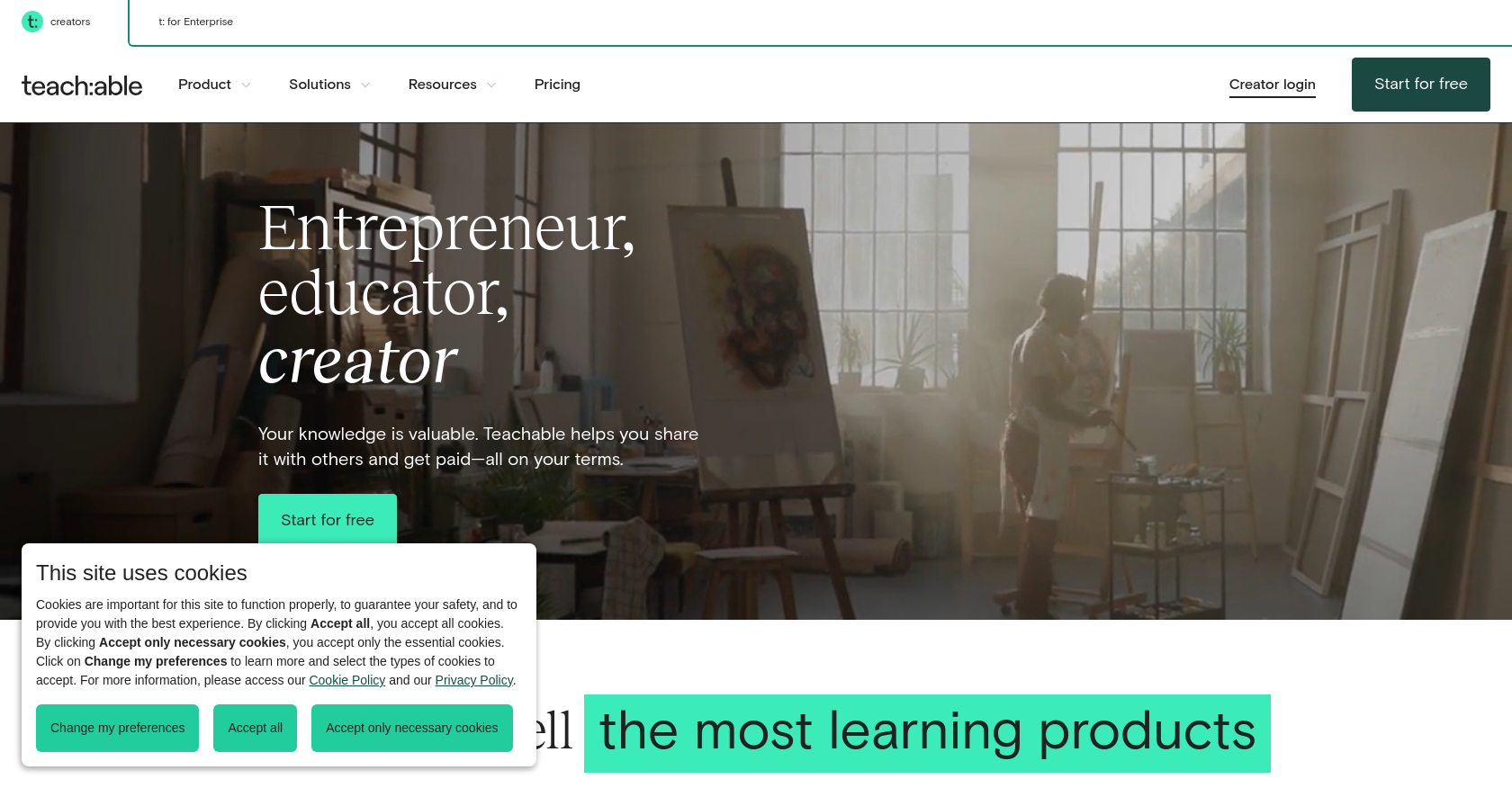
Overview
Teachable simplifies course creation, offering a practical solution for creators eager to turn their knowledge into a scalable product. With intuitive tools and built-in payment processing, it’s well-suited for those new to online learning or running smaller programs.
Its platform focuses on straightforward course delivery, allowing creators to set up and sell content quickly. However, Teachable’s approach leans heavily on the basics—while capable of facilitating course launches, it doesn’t provide the robust community-building or advanced customization features needed for deeper engagement.
Key Features
- Streamlined Course Creation: A user-friendly interface supports quick course setup with options for pricing, templates, and drip content.
- Integrated Payments Made Easy: Teachable:Pay handles global payment processing, tax compliance, and flexible checkout options to support creators’ revenue goals.
- Limited Community Interaction: Basic tools like lecture comments provide some learner engagement, though they’re not designed for fostering larger, connected communities.
Teachable delivers on simplicity, but for creators seeking a more dynamic, community-driven learning experience powered by AI, exploring alternatives like Disco may provide the tools to scale impact while enhancing learner engagement.
5) Podia
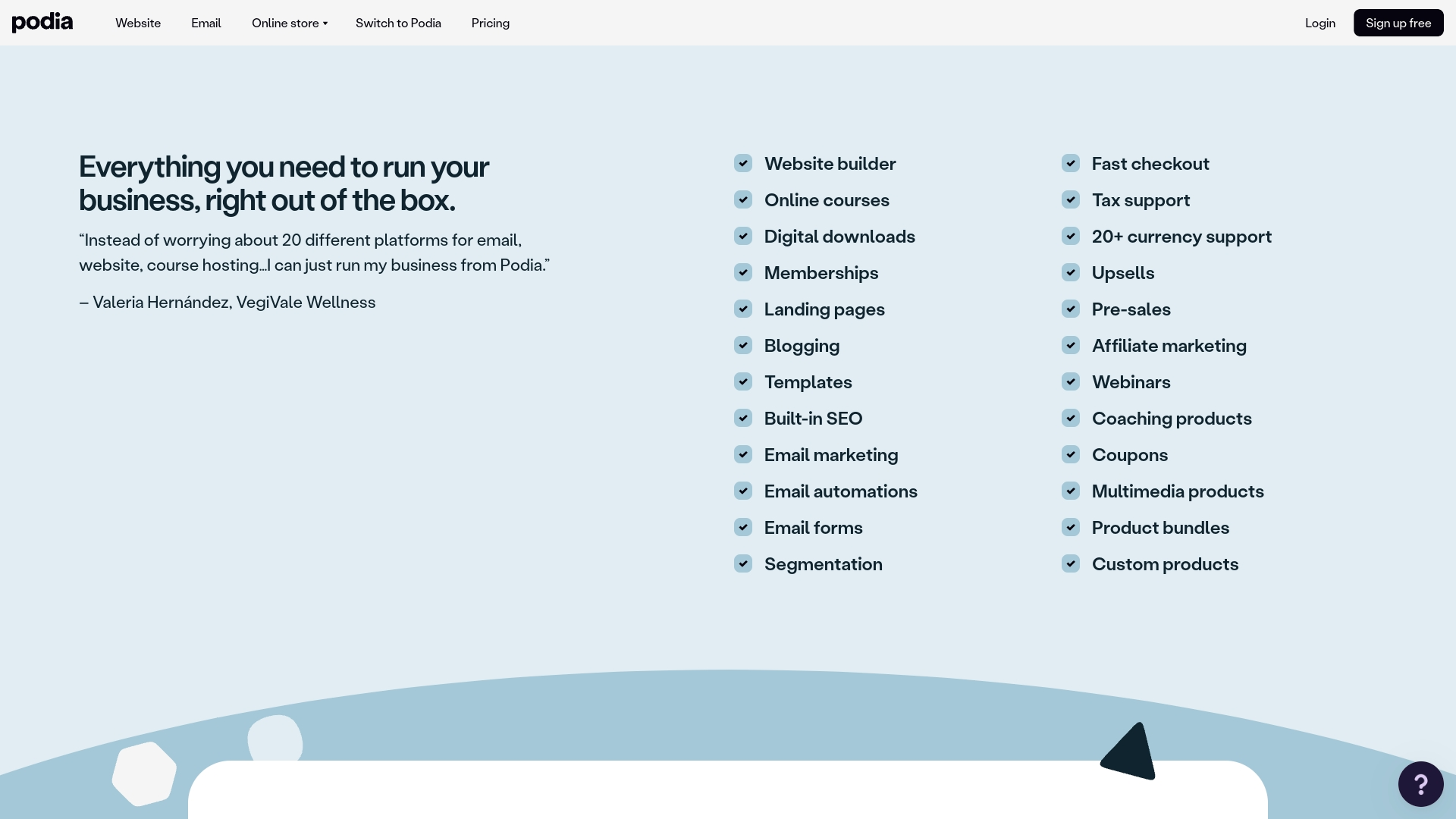
Overview
Podia brings simplicity to selling online courses, memberships, and digital products. It’s built for creators who want an easy way to manage their offerings without dealing with technical complexity. The platform combines tools for hosting, email marketing, and customer interaction, making it a solid choice for leaner training programs or smaller-scale communities.
Podia’s straightforward design is appealing to creators who prioritize ease of setup. However, for organizations looking to scale their efforts or integrate more advanced features like AI-driven personalization and community engagement, platforms like Disco provide a more comprehensive solution.
Key Features
- Seamless Marketing and Sales Integration: From email automation to affiliate management, Podia supports creators in building and nurturing their audience while driving sales. The Shaker plan even eliminates transaction fees for a smoother revenue stream.
- Unlimited Content Hosting: Whether it’s courses, downloads, or memberships, Podia ensures there are no limits on how much content you can share, giving creators the freedom to scale their digital offerings.
- Essential Community Tools: Podia incorporates simple features like discussion boards and live chat widgets, offering a basic level of interaction. For richer community dynamics and deeper engagement, platforms like Disco offer more advanced, integrated options.
Podia is a practical choice for independent creators who need a straightforward, all-in-one platform. Still, training businesses with a vision for growth, robust community-building, or AI-enhanced operations may find greater alignment with solutions designed to scale alongside their ambitions.
6) LearnWorlds
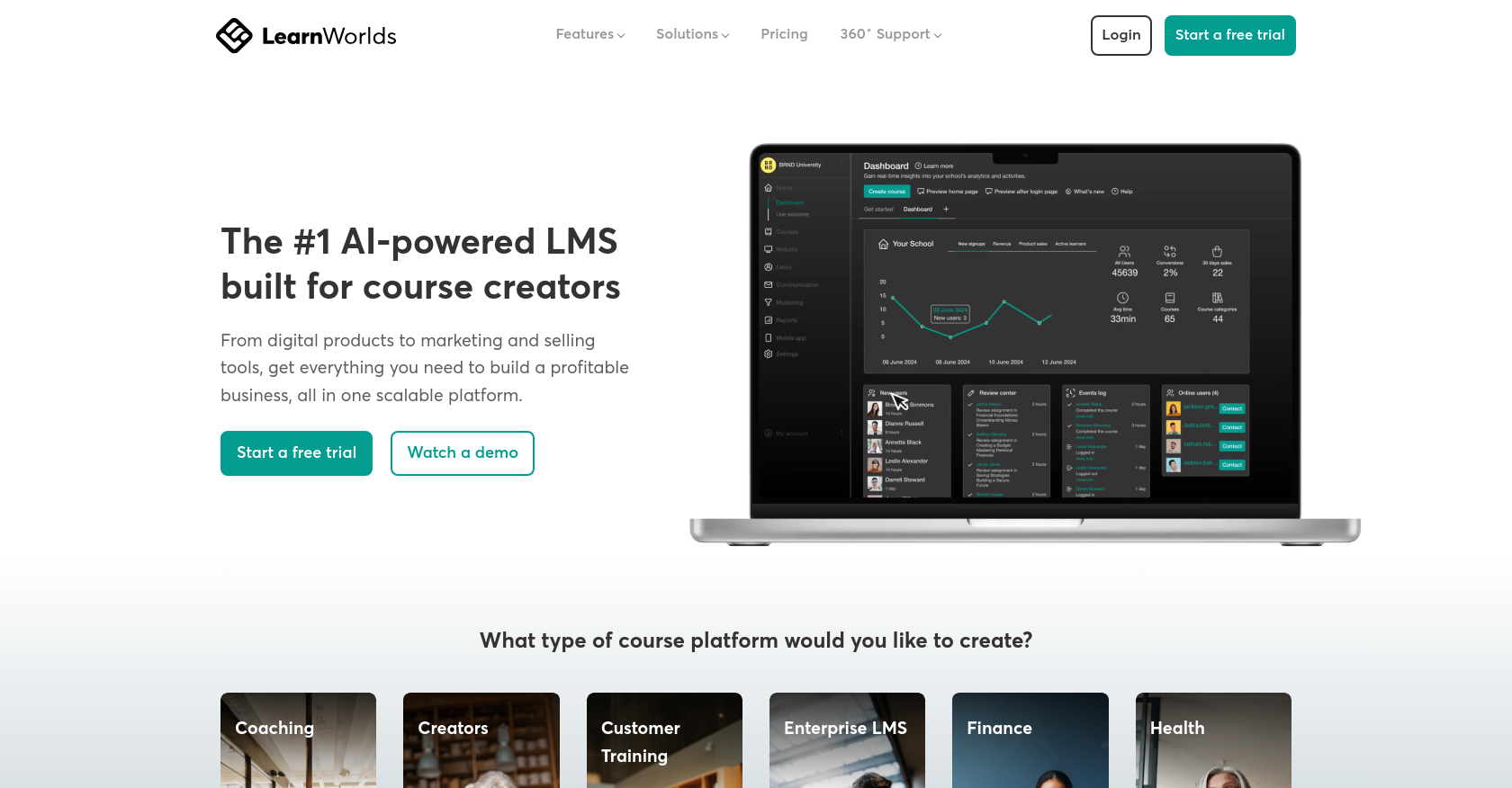
Overview
LearnWorlds centers its approach on creating immersive, video-driven learning experiences. With a focus on interactivity, it offers tools that make course design dynamic and engaging. For learning businesses aiming to captivate their audience, the platform provides features like in-video quizzes and SCORM compatibility to deliver structured, multimedia content.
However, while LearnWorlds performs well in content creation, its community-building capabilities are less developed. For organizations looking to foster deeper connections alongside learning, this can be limiting compared to platforms that integrate community as a core component.
Key Features
- Interactive Video Tools: Add clickable elements, quizzes, and prompts directly into videos to create an engaging learning journey.
- SCORM and HTML5 Support: Seamlessly upload standardized packages for professional, scalable course delivery.
- Streamlined Documentation: Automate tasks like generating transcripts and issuing certificates to focus more on strategy and less on admin.
- Community Add-Ons: Enable group discussions, though the functionality may feel secondary for those prioritizing community as part of their learning ecosystem.
LearnWorlds provides a strong foundation for interactive learning but leaves gaps for those looking to combine rich community engagement with operational simplicity.
7) Circle
Circle takes a fresh approach to creating interactive, community-driven spaces. It’s designed for organizations that prioritize connection and engagement, offering tools that make it easy to build vibrant networks of learners and members. With features like live streams, discussion forums, and event hosting, Circle simplifies the process of fostering meaningful interactions within a digital environment.
What sets Circle apart is its focus on flexibility. From customizable branding to integrated automations, it empowers training businesses to create spaces that feel tailored and intuitive, without adding unnecessary complexity. Whether it’s managing memberships or delivering interactive content, Circle provides a foundation for social learning that feels both modern and approachable.
Key Features
- Seamless Community Interaction: Tools like group chats, live-streaming capabilities, and structured discussion forums create dynamic spaces for collaboration.
- Customizable Design: Options for branded domains and mobile apps allow organizations to maintain a consistent, polished identity across platforms.
- Integrated Efficiency: Automations through Zapier and workflow tools streamline operations, making scaling your community effortless.
- Monetization Options: Paid memberships, subscription models, and event paywalls enable diverse revenue strategies—all within the same platform.
Circle is ideal for businesses that lead with community-first experiences. However, for those requiring advanced AI capabilities to design, deliver, and optimize learning programs, Disco provides a more robust solution tailored to the future of education.
8) Skool
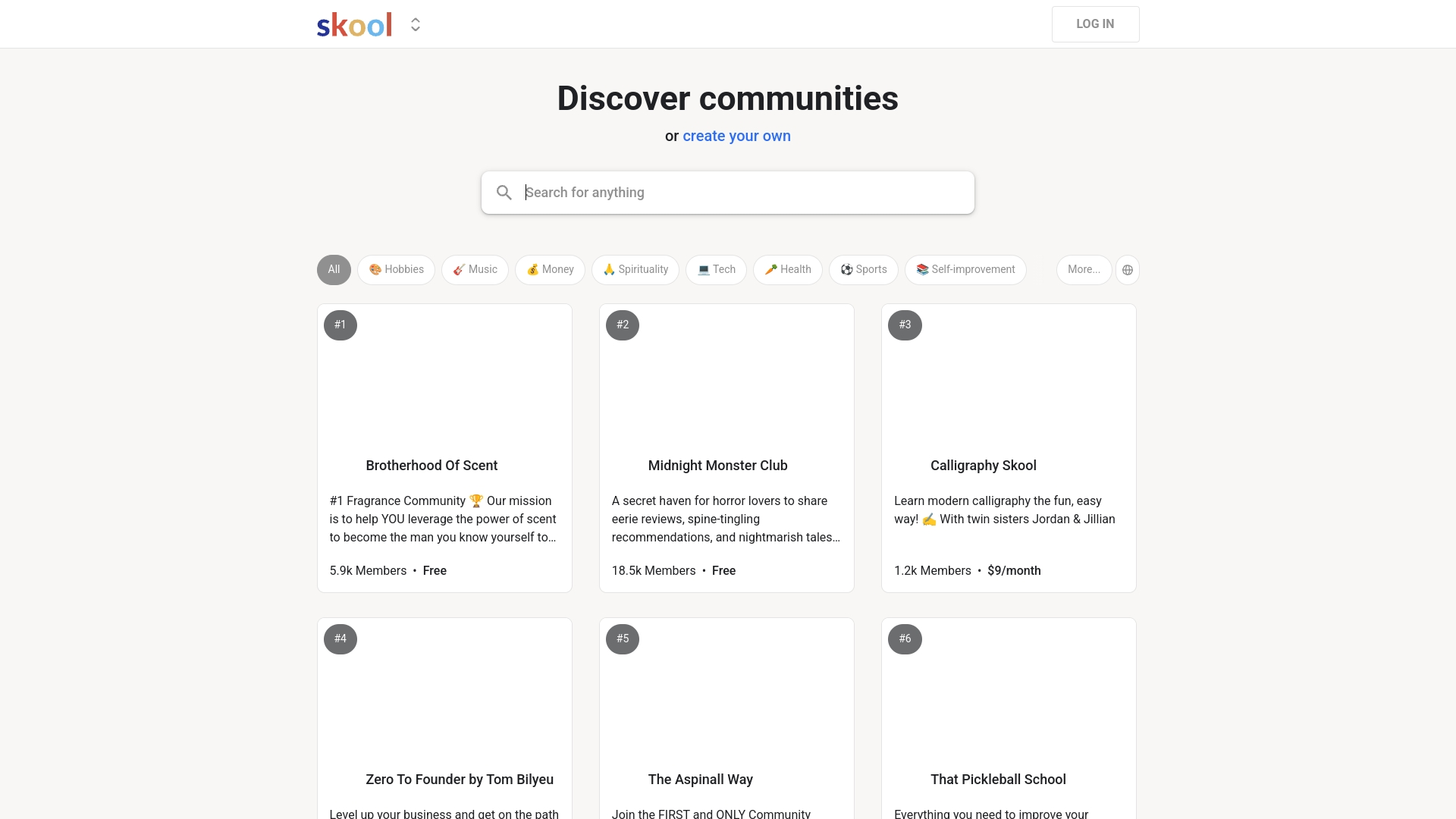
Overview
Skool focuses on creating a simple, intuitive experience for training businesses looking to foster group-based learning. With tools designed to streamline content sharing, group interaction, and member management, Skool creates an environment where collaboration comes first. It’s a platform built for those who prioritize ease of use and community engagement over more technical or AI-powered features.
While Skool’s straightforward design makes it approachable for smaller teams or solo creators, it doesn’t offer the depth or automation capabilities needed to scale large, data-driven training programs. That’s where platforms like Disco provide more advanced functionality, blending AI and community into a seamless experience.
Key Features
- Gamified Engagement: Skool motivates learners by rewarding participation with points, creating an interactive and fun group dynamic that keeps members engaged.
- Transparent Pricing Model: For $99/month, users get access to all features, unlimited courses, and unlimited members, with a flat 2.9% transaction fee. It’s a no-surprises approach that appeals to creators seeking simplicity.
- Community-Driven Focus: Skool prioritizes group discussions and collaborative learning rather than standalone courses, making it a great fit for programs centered on peer interaction.
Skool’s focus on simplicity and collaboration resonates with creators who want to build tight-knit communities. However, for those looking to integrate AI-driven tools for personalized learning journeys or to scale programs efficiently, platforms like Disco offer a more robust solution.
9) LearnDash
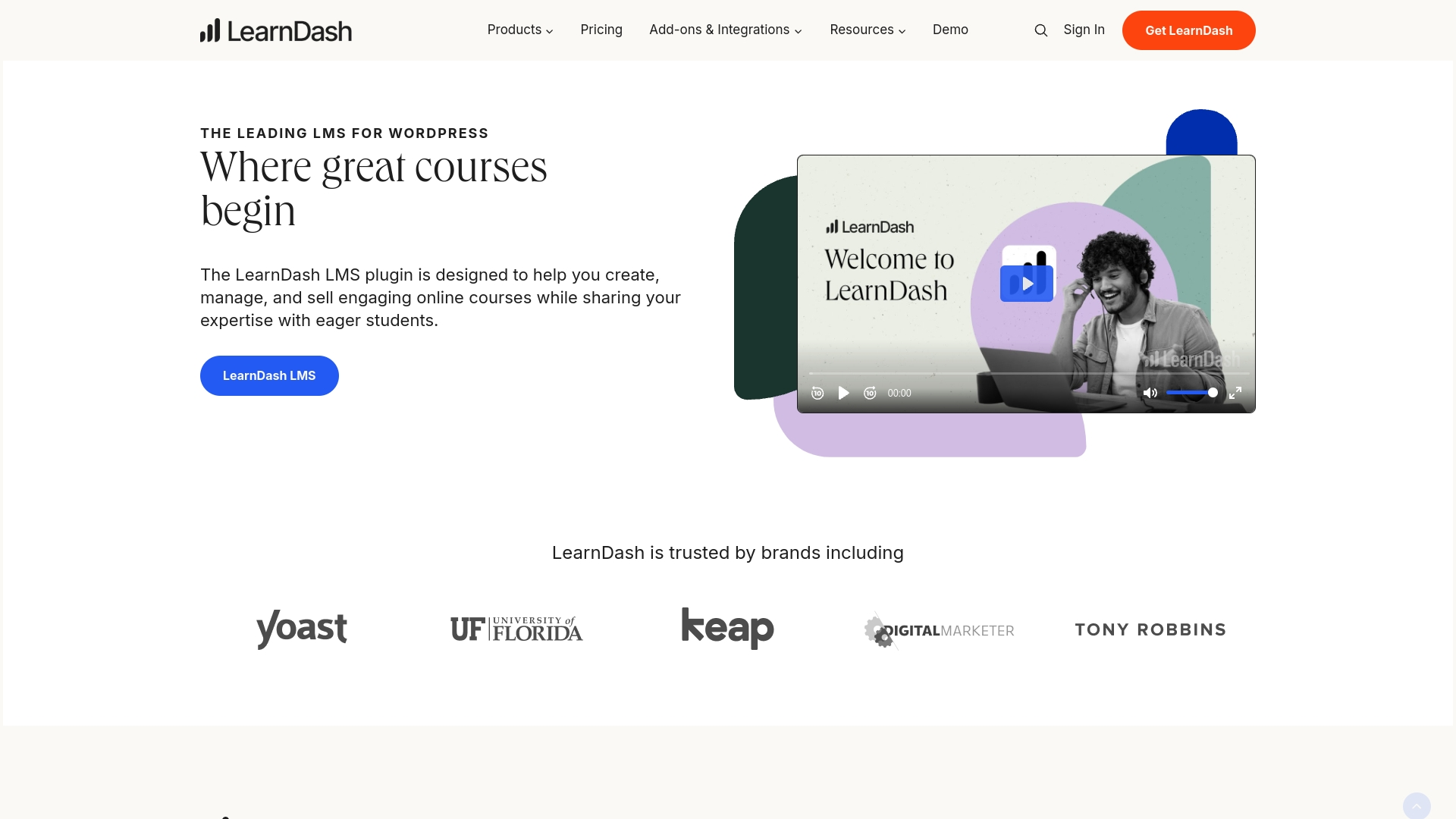
Overview
LearnDash brings structure and flexibility to organizations building professional-grade courses on WordPress. With its deep integration into the WordPress ecosystem, it’s designed for those who want to craft highly customized learning environments while maintaining control over every detail.
Whether you’re designing a technical skills course or delivering corporate training, LearnDash offers the tools to organize content, track progress, and create tailored experiences for learners. It’s a solution that caters to the needs of instructional designers and educators seeking precision in their programs.
Key Features
- Customizable Quizzing: Design interactive quizzes with multiple question types and automated feedback, allowing learners to test their understanding in meaningful ways.
- SCORM/xAPI Support: Seamlessly incorporate SCORM or xAPI files to deliver standardized eLearning content across platforms.
- Progress Tracking and Focus Tools: Help learners stay engaged with video progression requirements, Focus Mode, and goal-oriented tracking features.
- Community Add-Ons: Use membership plugins to integrate social elements like forums and group discussions, enabling collaborative learning.
- WordPress Flexibility: Take advantage of the WordPress ecosystem to align your courses with your brand and leverage plugins for extended functionality.
LearnDash excels in providing a highly customizable framework for course creation. However, for those prioritizing AI-powered automation and deeply integrated social learning tools, platforms like Disco offer a more seamless and connected approach to scaling impactful educational experiences.
10) ProProfs
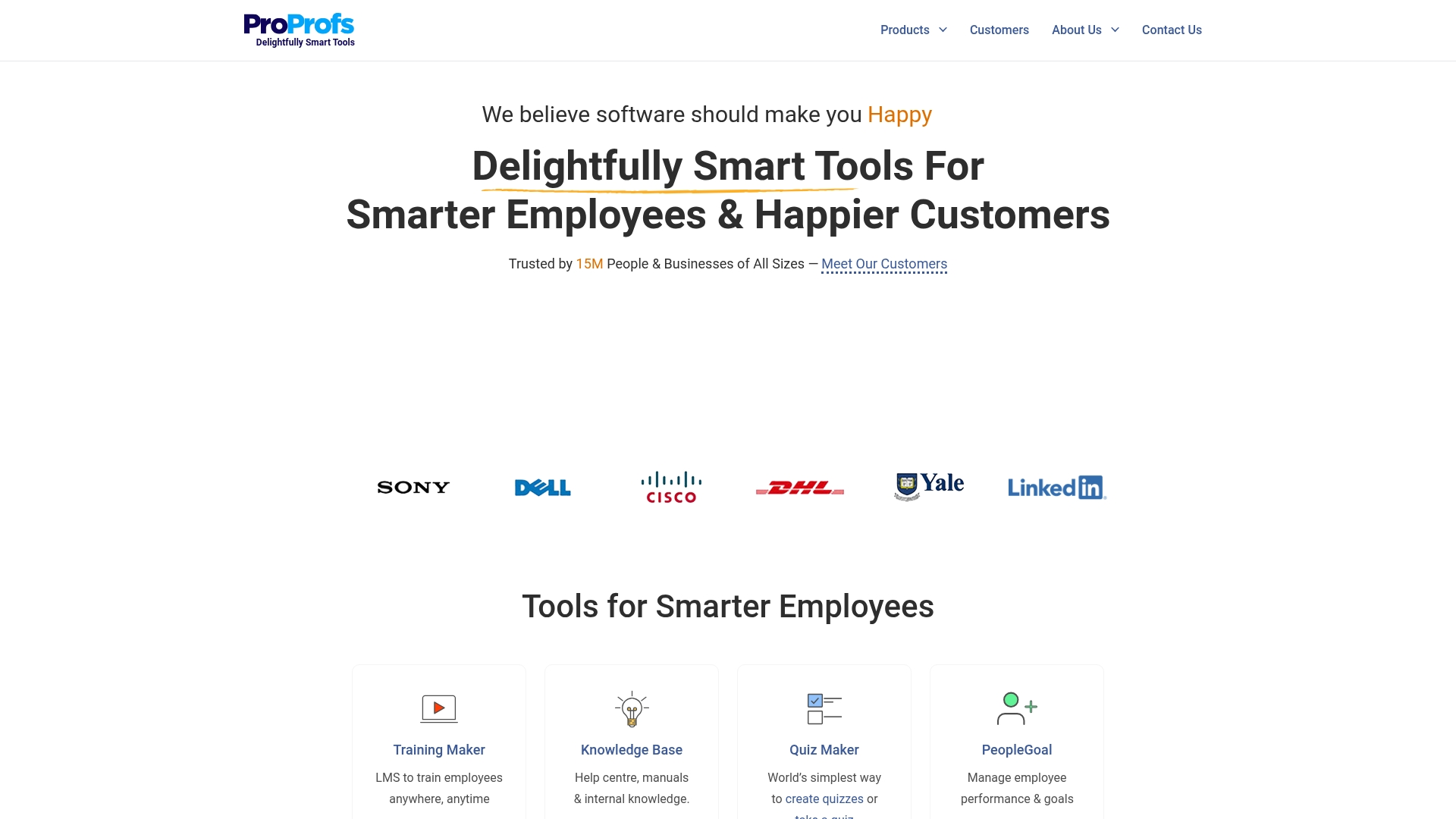
Overview
ProProfs takes a focused approach to workplace learning by blending quizzes, training courses, and assessments into one platform. Its strength lies in simplifying compliance training and skill development. This is a solution designed to streamline the repetitive parts of learning, offering tools that reduce friction in both content creation and knowledge tracking.
While ProProfs helps organizations achieve efficient delivery of training programs, the platform’s emphasis on individual assessments means it leans less toward fostering collaborative or community-driven learning. For teams prioritizing scalable social engagement and deeper AI integration, other tools may align better with those goals.
Key Features
- AI-Powered Quiz Builder: ProProfs uses artificial intelligence to simplify quiz creation, leveraging a library of over 100,000 ready-to-use questions and templates. Automated grading further removes the administrative burden, making it easier to focus on learner outcomes.
- Personalized Branding and Certificates: The platform includes tools to customize branding elements like logos and themes, along with the ability to create tailored certificates. While the branding options are functional, they offer less flexibility compared to more design-forward platforms.
- Seamless Knowledge Base Integration: ProProfs supports knowledge-sharing by linking training content to centralized resources, enabling learners to access supplementary materials without leaving the platform.
- Insightful Reports and Compliance Features: Built-in analytics and automated reminders help ensure compliance while providing trainers with actionable insights into learner progress.
ProProfs is ideal for organizations centered on structured, assessment-driven learning. However, for businesses aiming to integrate collaborative communities and advanced AI capabilities into their training programs, platforms like Disco offer a more holistic and innovative approach.
11) TalentLMS

Overview
TalentLMS simplifies training for small and medium-sized businesses by offering a straightforward and efficient way to manage compliance and skill-building programs. With a clean interface and quick setup process, it’s designed for organizations that need their systems to work seamlessly from day one.
The platform provides a solid foundation for structured learning, focusing on tools that support assessments, certifications, and gamified engagement. However, for businesses that see community-driven learning as the future, or want AI to play a bigger role in scaling their programs, the experience might feel more traditional compared to the innovation offered by Disco.
Key Features
- Modern Content Standards: With SCORM and xAPI support, TalentLMS ensures compatibility with a wide range of eLearning materials, making it accessible to organizations with diverse training needs.
- Engaged Learning with Gamification: Points, badges, and leaderboards bring a playful element to learning, keeping participants motivated and active throughout their journey.
- Certifications Made Simple: Automate the creation of custom certificates and recertifications, reducing administrative workloads while maintaining professionalism.
- Basic Community Tools: TalentLMS includes discussion forums, which allow for some interaction among learners, but they lack the depth and dynamic features that help foster meaningful connections in larger communities.
For businesses focused on scaling their impact through personalized, connected learning experiences, platforms like Disco offer tools that go beyond traditional LMS capabilities to redefine what’s possible.
12) BuddyBoss
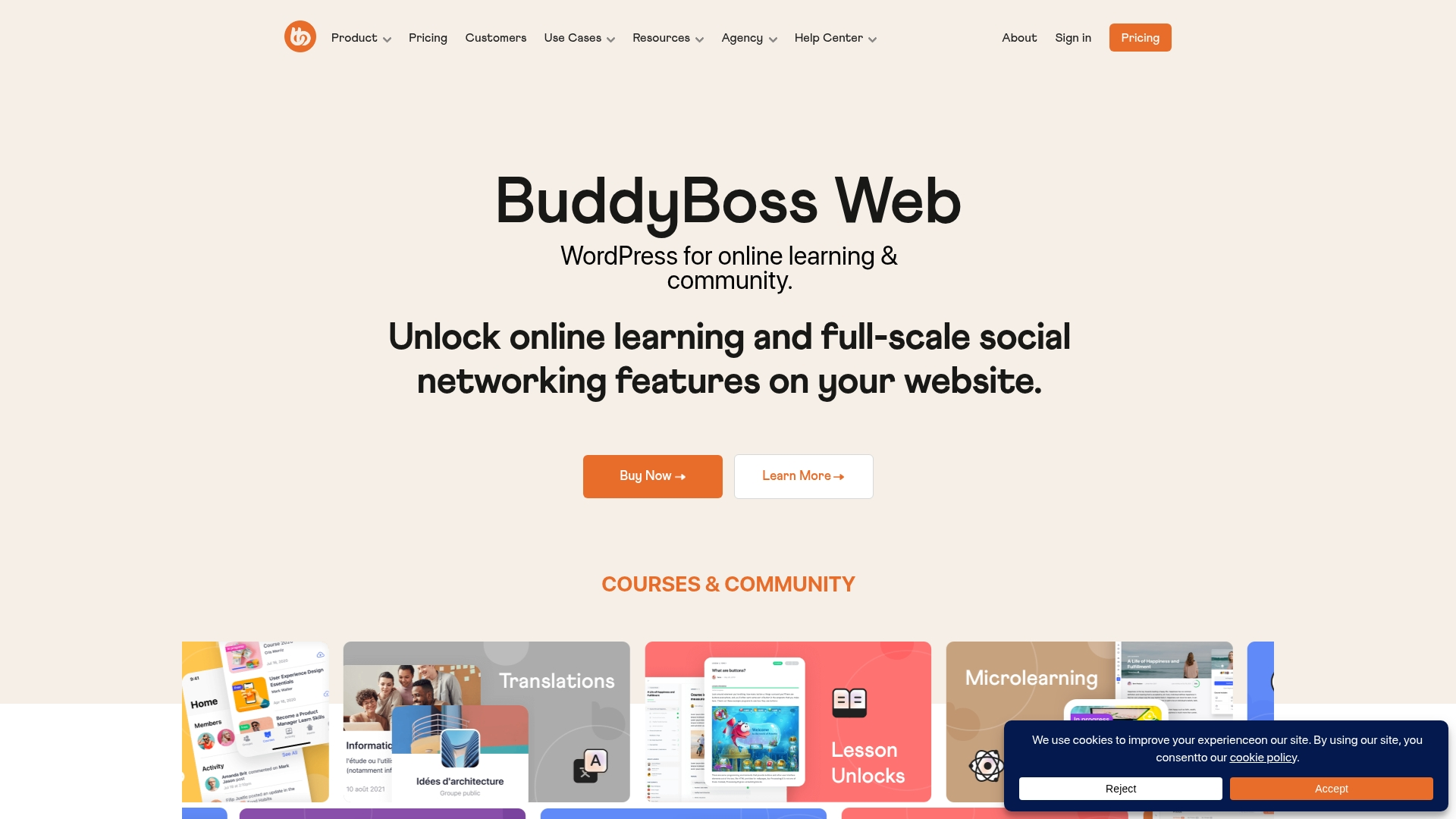
Overview
BuddyBoss offers a WordPress-powered framework designed to bring social interaction and learning under one roof. It’s a platform that combines the flexibility of an open-source ecosystem with tools to build connected, community-driven learning experiences. By integrating with learning management systems like LearnDash and LifterLMS, BuddyBoss allows organizations to create spaces where education and collaboration thrive side by side.
Its standout feature is the ability to transform a website into a vibrant social learning hub. Whether it’s through group forums, private messaging, or activity feeds, BuddyBoss centers on building dynamic communities tailored to the needs of learners and educators alike.
Key Features
- Social Networking for Learning: Build engagement through customizable user profiles, activity streams, and messaging tools that foster connection and collaboration.
- Seamless LMS Integration: Pair the platform with tools like LearnDash or LifterLMS to design structured courses that incorporate gamification, quizzes, and certification.
- Custom Branding and Design: Create a learning environment that reflects your organization’s identity with white-label options, personalized domains, and flexible themes.
- Scalability for Growth: Accommodate unlimited members, groups, and events, ensuring the platform grows alongside your community’s needs.
- Engagement Tools: Keep learners motivated with gamification features like badges and points via GamiPress.
BuddyBoss is ideal for organizations that value customization and are comfortable navigating WordPress. However, while its setup offers freedom, it also requires significant time and technical expertise to manage. For teams seeking a more streamlined and AI-enhanced operational experience, solutions like Disco provide an intuitive alternative designed to save time while delivering personalized, data-driven learning journeys.
Next Steps
AI is reshaping the way we create, deliver, and scale impactful learning programs. To get started, take a moment to define what matters most to your organization. Is it the ability to design adaptive, personalized learning experiences? Do you need tools that seamlessly integrate community engagement with your training programs? Or are you looking for automation to remove repetitive tasks and free up your team’s time? Prioritizing these needs will help you identify the right solution for your goals.
Disco is built to meet the demands of modern training businesses, combining AI-powered curriculum design, integrated community features, and a beautifully branded experience—all in one platform. Whether you’re building your first cohort-based program or scaling a global academy, Disco provides the tools to bring your vision to life while keeping learners engaged every step of the way.
Curious about what Disco can do for your training programs? Book a Demo and see how easy it is to create dynamic, human-centered learning experiences. Your next step toward transforming learning starts here—Book a demo now to explore the possibilities.









